Air Quality in The Greater Jakarta Area Improves During PSBB: 5 Key Takeaways from 48 Ground Sensors
Unprecedented air pollution reductions were made earlier this year when the world went into strict COVID-19 lockdown. During this time, the PM2.5 levels in New Delhi were slashed by 60%, Seoul by 54% and Wuhan by 44%. Global media reported unfamiliar blue skies in the world’s most polluted cities, including in Jakarta.
Home to 32 million people, most of whom commute to the city, the Greater Jakarta Area is no stranger to unbearable traffic. Added with high demands of electricity generation, growing industry, and a lack of enforcement against trash burning, air quality in the region has been steadily worsening year after year. AQLI predicts that the average Jabodetabek resident would lose 4.9 years of life expectancy due to air pollution. Globally, 8 million people die from air pollution-related causes each year, killing more than COVID-19, tuberculosis, malaria and car accidents combined.
What is even more devastating is that “many of the pre-existing conditions that increase the risk of death in those with COVID-19 are the same diseases that are affected by long-term exposure to air pollution.” A Harvard University study suggests that an increase of only 1mg/m3 in PM2.5 is associated with an 8% increase in COVID-19 death rate (95% confidence interval). To put into perspective, the average Jabodetabek air quality in June 2020 (71mg/m3) is 4.9 times more likely to increase in COVID-19 death rate than in a city that meets the WHO standards (10mg/m3).
That said, here’s some good news on air quality during the four weeks of PSBB:
-
PSBB months on average have lower AQI levels than non-PSBB months
PSBB months are on average unhealthy for sensitive groups (AQI 101–150) and PSBB Transisi months are on average unhealthy (AQI 151–200). The PSBB in DKI Jakarta (Sep 14 — Oct 11) resulted in decreased AQI levels compared to previous months, though not as low as in May, where all regions enforce the PSBB regulations. The 2nd PSBB is only applicable to DKI Jakarta, and was relatively more lax in comparison, but nevertheless still made a noticeable impact on Jabodetabek’s air quality.
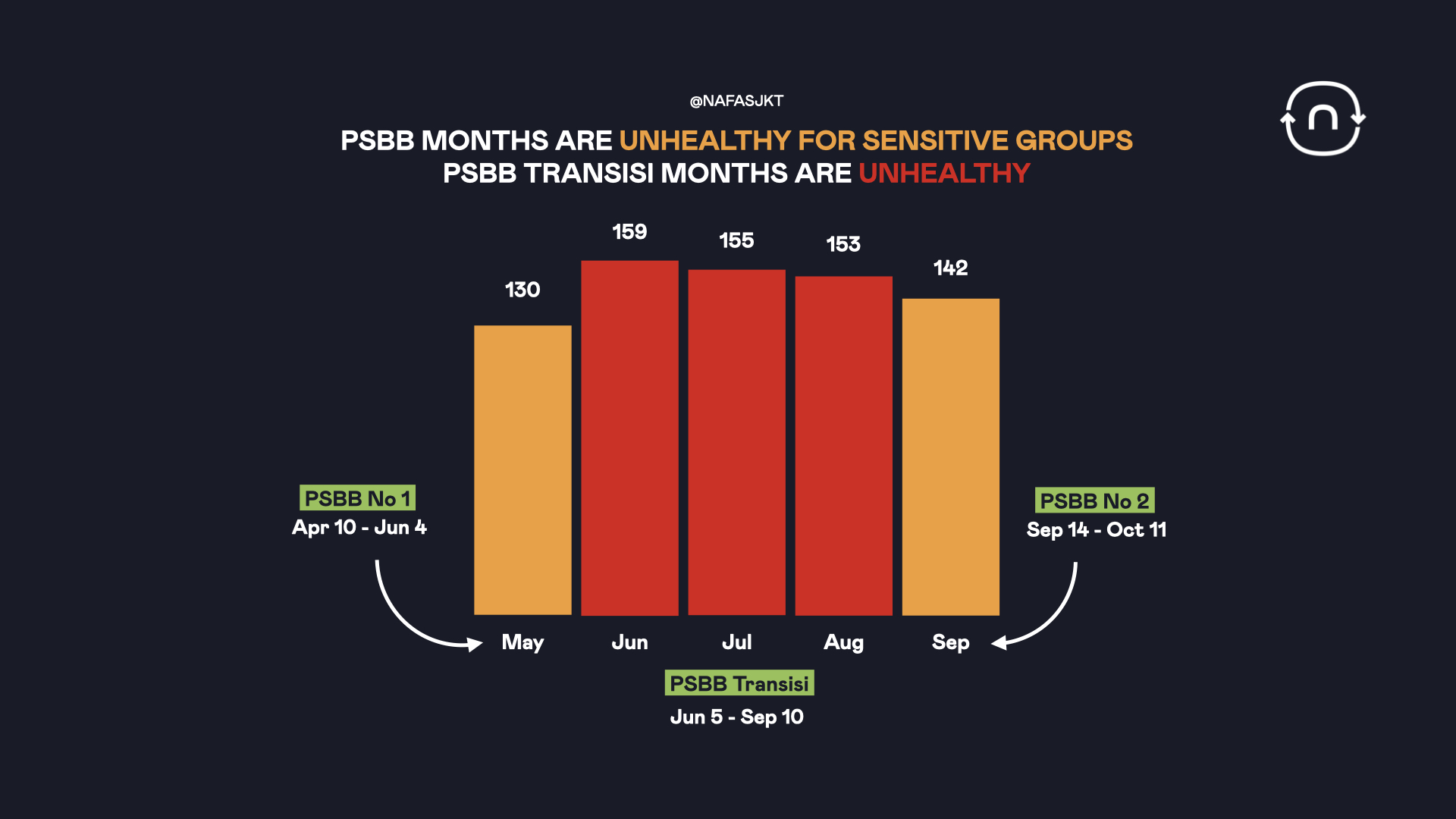
-
As PSBB continues, the air quality gets better
The average for 1 week before PSBB is AQI 156 (unhealthy), and the fourth week of PSBB was AQI 102 (unhealthy for sensitive groups). Week after week there is a consistent downward trend of AQI levels, indicating an improvement in air quality. The change from PSBB levels is even more drastic after week 3 and 4, with 24% and 35% reductions respectively, in contrast to 6% and 9% in weeks 1 and 2. Unfortunately, the 2nd PSBB ended after four weeks, and the AQI levels for the week post-PSBB has started increasing again, though not immediately back to unhealthy levels (also thanks to the rain!)
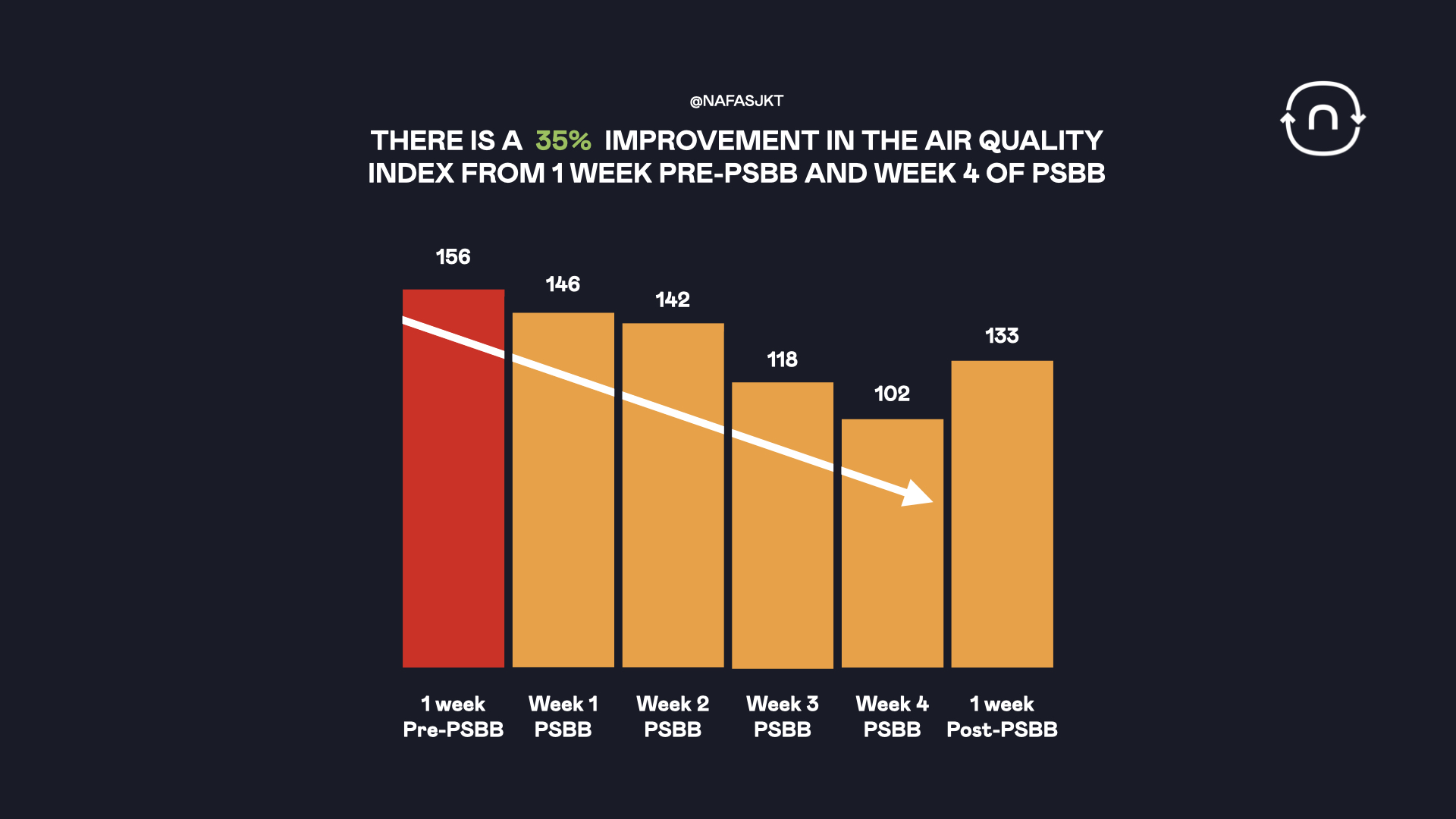
-
37 of 48 sensors met the WHO standards of PM2.5 24-hour mean by at least one day
While this actually sounds horrific that only one day on average met the WHO standards, it’s actually (relatively) good news in comparison to previous months. On October 5th, which is on the 4th week of PSBB, the daily average for all Nafas sensors is AQI 78, or PM2.5 of 25mg/m3, which is exactly the cut off to meet the WHO standard of PM2.5 24-hour mean. If we look at individual sensors, 23 sensors met WHO standards for 1 day, 3 sensors for 2 days during the PSBB period, 6 sensors for 3 days, and East Bogor tops the list with 5 out of 28 days of WHO standards met. Surprisingly, our sensor at Bantar Gebang landfill, which usually topped the rank in AQI levels had three days that met the WHO standards during the last week of PSBB.
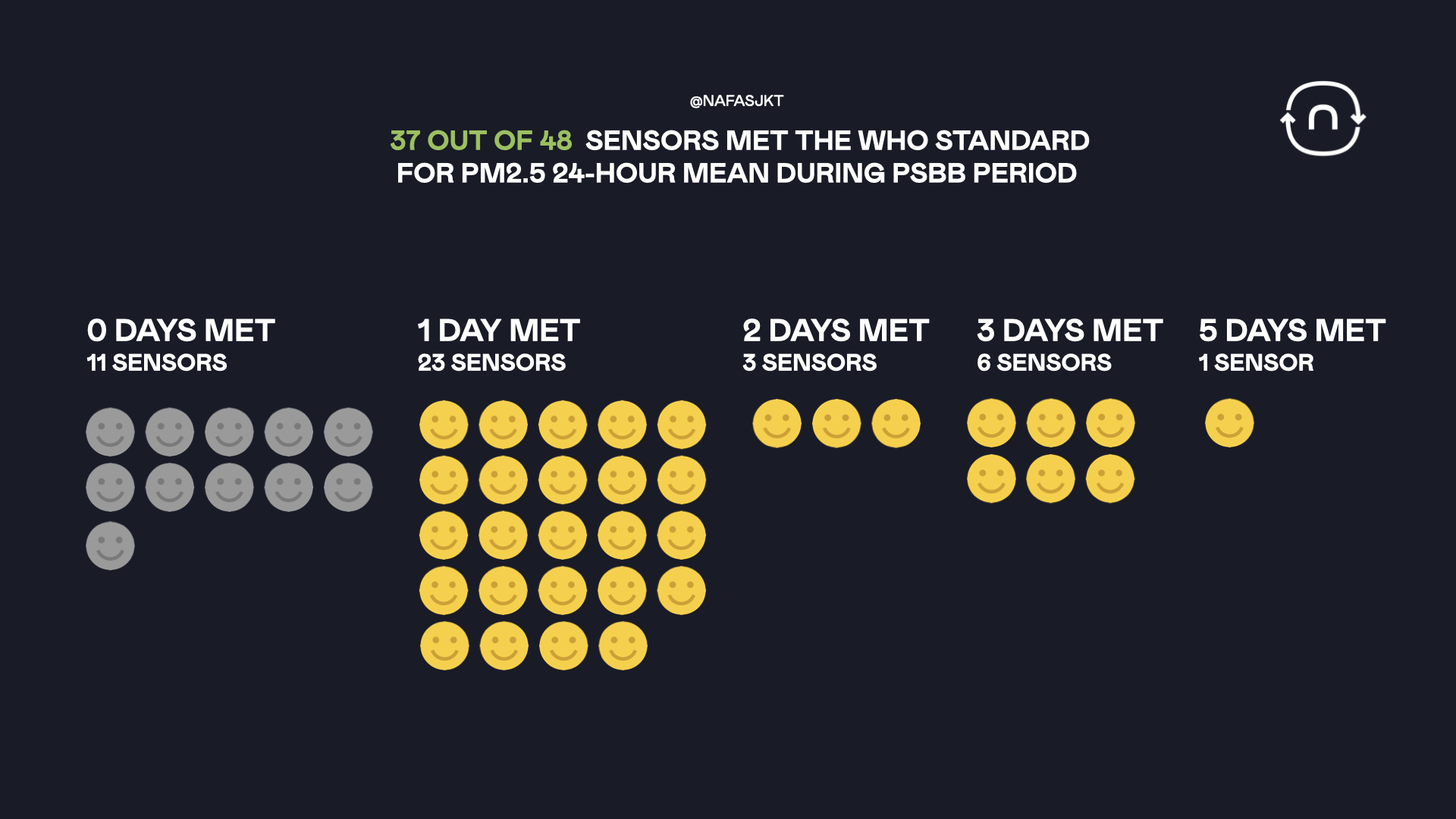
-
PM2.5 levels were decreased by 45% from Pre-PSBB levels, which is equivalent to reducing 40 cigarettes per month!
Berkeley Earth came up with an air pollution to cigarette conversion, where PM2.5 of 22mg/m3 = 1 cigarette.
With pre-PSBB levels, Jabodetabek’s air quality is equivalent to smoking almost 3 cigarettes per day, or 89 cigarettes per month. In the fourth week, the air quality is equivalent to smoking is nearly halved to 1.6 cigarettes per day. If the 4th week of PSBB levels continue for an entire month, Jabodetabek residents would reduce their air pollution exposure to 40 cigarettes per month from normal levels. That is two packs of cigarettes! To put into perspective, the air quality in the United States is equivalent to 0.4 cigarettes per day, or 12 cigarettes per month. While we are still far from that number, the significant reduction during PSBB sure does bring hope.
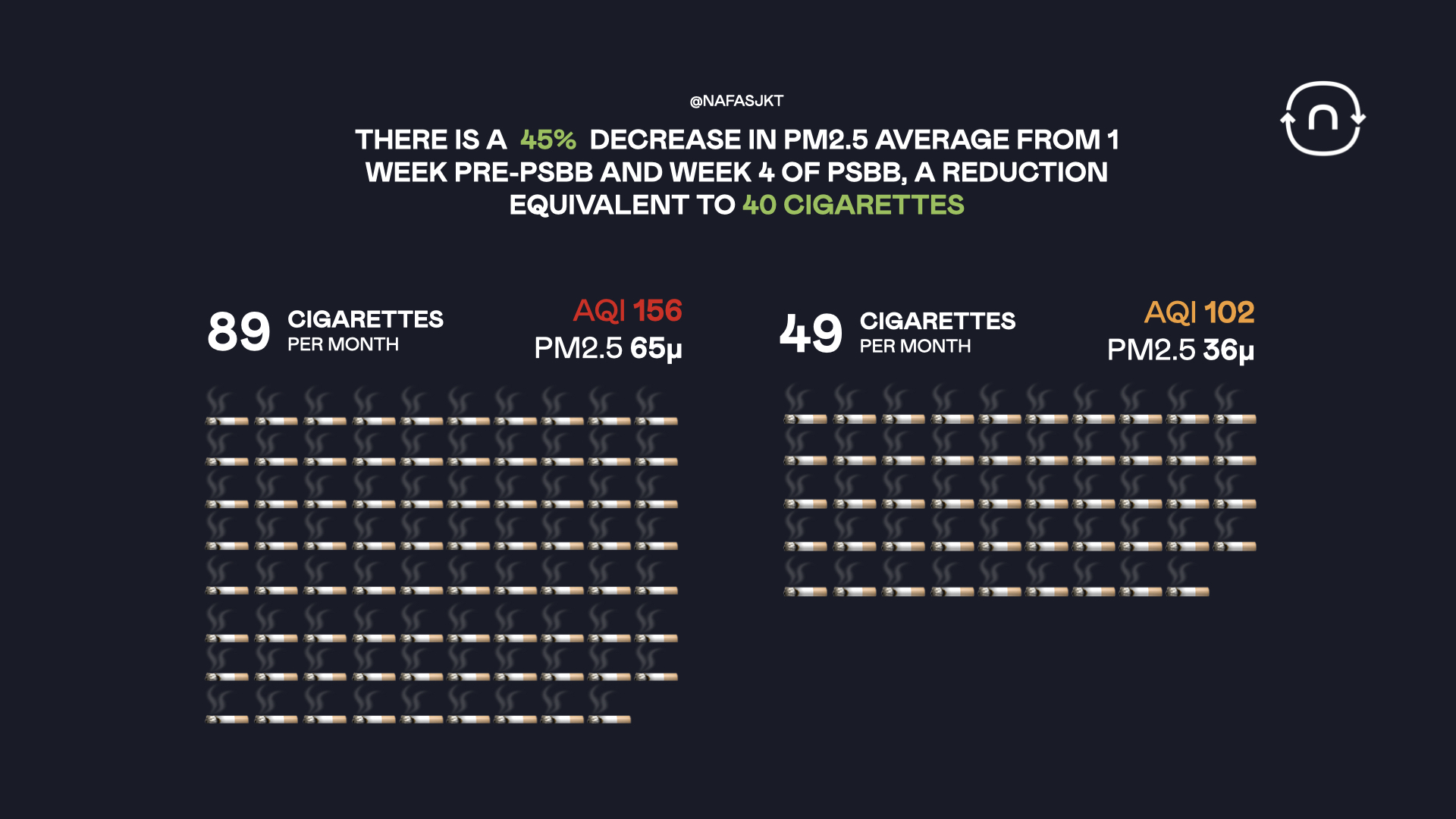
-
Exercising in PSBB air quality levels is more beneficial than during Pre-PSBB levels
Exercise is known to provide a myriad of benefits, from an increase in energy levels and elevated mood to decreased health risks and extending longevity. A Centre for Diet and Activity Research (CEDAR) study suggests that high levels of air pollution may make our exercise more harmful than beneficial:
When the PM2.5 level is at 100mg/m3 (AQI 175) outside, then after 30 minutes there is no benefit to the exercise, and after 75 minutes, said exercise causes harm. At 165mg/m3 (AQI 217), the exercise causes harm after just 30 minutes.
In August, 16% of total hours from all our sensors exceed PM2.5 levels of 100mg/m3 (AQI 174, unhealthy) and 2.1% of total hours exceed 165mg/m3 (AQI 215, very unhealthy). In contrast, during the 4 weeks of PSBB, only 3.5% of total hours exceed 100mg/m3 and 0.3% of total hours exceed 165mg/m3. This is a reduction of 4.6 times and 7 times from the previous month! That means, your outdoor activities were much more beneficial to your health in PSBB levels than before. Air quality can vary a lot in just a few moment’s time, which is why it’s important to check real-time air quality data before exercising outdoors!
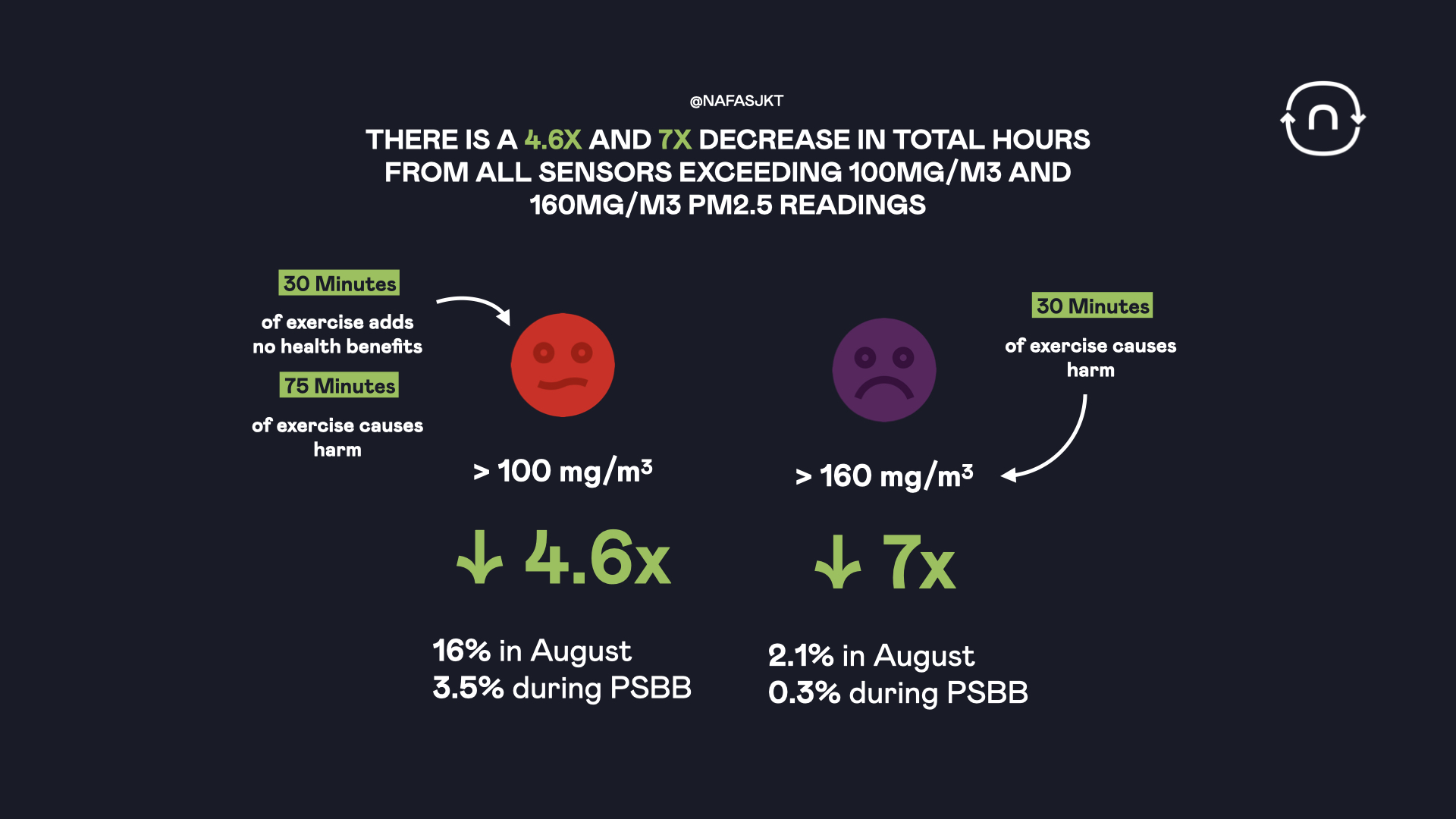
Data from Nafas Jakarta
Data is from 48 Nafas Jakarta sensors across the Greater Jakarta Area (DKI Jakarta, Tangerang, Tangerang Selatan, Depok, Bekasi, Bogor). Nafas aims to empower Jabodetabek residents to reduce their exposure to air pollution through real-time air quality data. To learn more about Nafas, visit our website nafas.co.id or @nafasjkt in social media channels.